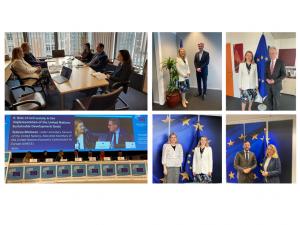In her first visit to Brussels as UNECE Executive Secretary, Tatiana Molcean held strategic discussions this week with European Commissioners for environment and energy, and high-level officials responsible for industrial policy, trade and cooperation with EU acceding, candidate and neighbouring countries.
With 27 countries out of 56 UNECE member States, the EU is a strategic partner in UNECE’s work, notably where its legal and regulatory frameworks, standards and policy support make a tangible contribution across key sectors.
Discussing common priorities with Commissioner for Environment, Oceans and Fisheries, Virginijus Sinkevičius, ahead of the sixth session of the UN Environment Assembly, the Executive Secretary recalled the role of UNECE’s Multilateral Environmental Agreements to deliver climate action, tackle pollution and protect biodiversity. Transposed into EU directives, the impact of these tools is tangible in Europe. She also thanked the EU for its promotion of cooperation on cross-border water resources through accession by countries worldwide to the UN Water Convention.
With Energy Commissioner Kadri Simson, the Executive Secretary welcomed strong cooperation to advance the net-zero transition as a foundation for the EU Green Deal and 2030 Agenda, including through the mandatory use of the UN Framework Classification for Resources (UNFC) and environmental treaties in the implementation of the EU Critical Raw Materials Act, as well as support for renewable energy, and mobilizing action on methane at the upcoming Global Methane Forum in Geneva (18-21 March).
UNECE tools are also of strategic importance for the EU economy, as emphasized in exchanges with Director-General for Internal Market, Industry, Entrepreneurship and SMEs, Kerstin Jorna. UN vehicle regulations developed at UNECE’s World Forum are for example key for the EU automotive sector, which employs some 13.8 million people and accounts for over 7% of EU GDP. The recognition of these regulations is also included in all free-trade agreements negotiated by the EU with major markets worldwide. UNFC has also been used to support the EU’s battery strategy, while the UN/CEFACT normative framework of The Sustainability Pledge is being used to improve traceability to support due diligence in the garment and footwear sector in Europe and worldwide, an issue of paramount importance for the EU with regard to the Digital Product Passport.
In the area of trade, discussions with Deputy Director-General Leopoldo Rubinacci underscored common understanding of the crucial role of international trade for the SDGs and the importance of the multilateral rules-based trading system. Discussions acknowledged the role of UNECE in supporting countries’ path towards WTO accession and the role of UNECE in setting standards to facilitate trade.
Synergies between EU neighbourhood and enlargement policies and UNECE’s technical support to its programme countries in Eastern and South-Eastern Europe, the Western Balkans, the Caucasus and Central Asia was also high on the agenda in exchanges with Director-General for Neighbourhood and Enlargement Negotiations, Gert Jan Koopman, and Deputy Managing Director for Europe and Central Asia, European External Action Service, Luc Devigne. UNECE helps EU candidate or potential candidate countries progress towards the acquis communautaire in many areas through alignment with its international legal instruments and best practices, including technical and safety standards for road transport, railways and inland waterways and trans-European transport networks; independent and high quality official statistics; public participation and access to justice in environmental matters through the Aarhus Convention; air quality through the Air Convention; Environmental Impact Assessment and Strategic Environmental Assessment (Espoo Convention and its Protocol on SEA, as supported by the EAP Green and EU4Envionment projects); and industrial accidents prevention in line with the UNECE Industrial Accidents Convention.
The Executive Secretary further highlighted UNECE support to Ukraine's reconstruction. In alignment with EU Global Gateway priorities, she also emphasized work on trade and transport connectivity in Central Asia under the UN Special Programme for the Economies of Central Asia (SPECA), in particular to support digitalization of information exchange in the Trans-Caspian Corridor using UN standards and legal instruments.
Engaging with the wider civil society representatives, including employer and trade unions, Ms. Molcean addressed the Plenary session of the European Economic and Social Committee. Speaking about the role of civil society in delivering on the Sustainable Development Goals, examples of UNECE tools were underlined, including the use of the Aarhus Convention, noting that of the 219 cases submitted to the Convention’s Compliance Committee to date, 207 have been communications from the public. As an example of its impact, the EU amended its legal framework to enable environmental NGOs and the public to challenge acts and omissions of EU institutions which contravene EU law relating to the environment, in response to Compliance Committee recommendations following a complaint from an NGO. Civil society representatives were also encouraged to have a strong engagement at the upcoming UNECE Regional Forum on Sustainable Development (13-14 March).


